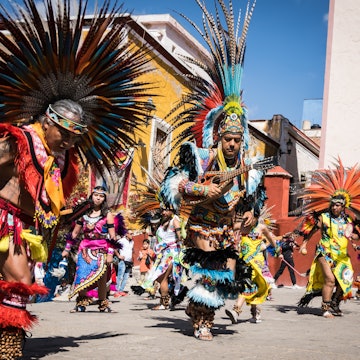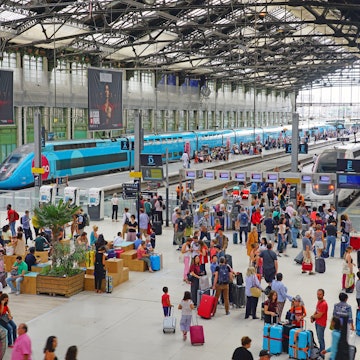

American travelers, once the golden goose of travel destinations, are increasingly being seen as the black sheep © YakobchukOlena/Getty Images
It's the height of summer travel season, and some Americans with quarantine fatigue are curing their cabin-fever fueled wanderlust by traveling to foreign locales. Rather than doling out warm welcomes, many countries are instead handing Americans a hard pill to swallow – rejection.
For Americans, who typically travel with impunity, the sudden role reversal is like a bad case of whiplash. According to data from the US Commerce Department, nearly 14 million Americans went overseas between June and August in 2019. In 2018, Americans spent $144 billion while abroad – more than any country aside from China.
Today, foreign countries are choosing health over wealth. Americans can't enter the EU. Canada is off-limits to non-essential travelers. The Bahamas recently announced US travelers will no longer be allowed into the country. US vacationers recently sparked protests in a Mexican border town, and Sardinia turned away a private jet with American passengers. While travel restrictions may vary from one country to the next, the sentiments are similar – American travelers pose a threat.

Keeping Kilfenora safe
When the pandemic upended international travel plans, Janet Cavanagh, who runs an electric bike tour company in Kilfenora, Ireland, redesigned her business to meet the market's demands. North Americans usually make up 80% of her guided tours, and without them, she pivoted to serve "local people looking for bike service and repairs, and local tourists who want to travel."
"Where we are – everybody is either employed in tourism or relies on something to do with tourism," says Janet. When she received a call late on July 11 to conduct a guided bike tour for two, she was initially thrilled.
After realizing the customers were from the US, Janet checked in to see if they completed the country's 14-day quarantine request. The couple did not; they didn't think it was mandatory. She decided to cancel their booking and sent them a refund.
https://twitter.com/e_whizz/status/1282199534093950976?ref_src=twsrc%5Etfw
"There are only three or four-hundred people living in our village. I didn't want to put anyone in danger – including myself and the rest of my family," she says.
Rocky relations at Rocky Point
Puerto Peñasco, also called Rocky Point, is a beach escape in the Mexican state of Sonora favored by Americans from Arizona. Hoping to capitalize on July 4th festivities, the town requested special permission from authorities to open the border for non-essential travelers from the US.
Sonoyta, which borders Arizona and acts as a gateway to the Sea of Cortez, had a different message. "We invite US tourists not to visit Mexico," said Sonoyta's mayor, José Ramos Arzate, in a statement.
After Mexico relaxed border restrictions, demonstrators blocked the road outside Sonoyta with their cars to deter American tourists.

Luis Alberto Gonzalez, the head of marketing for the Sonora Tourism Department, says, "There are two perspectives to consider." Puerto Peñasco's economy relies heavily on American tourists. To protect the town while encouraging outside visitors, local leaders installed health checkpoints for anyone entering the area "[Sonoyta] doesn't have the resources to have all those protocols in place," says Luis.
Although the two towns eventually compromised and granted Americans access, "the fear of what's happening in Arizona is a concern," Luis admits. Arizona, which was one of the first states to reopen its economy, is now seeing a surge in coronavirus cases.
"We're trying to be cautious – not encouraging travelers to visit yet," says Luis. “We're trying to send a message that first, let's get this crisis down, and let's get our hospitals ready to receive new patients."
A worldview of the United States
Janet and Luis aren't the only people with reservations about American tourists. A national survey recently conducted by Destination Canada found that only 6% of residents in British Columbia agreed with welcoming US visitors. In a poll conducted by the European Council on Foreign Relations, nearly two-thirds of respondents from Denmark, Portugal, France, Germany, and Spain said their view of the US worsened during the health crisis.
While this level of scrutiny isn't good news for American globetrotters, it won't likely last long.

Luis is already amenable to Americans crossing into Mexico, so long as they abide by proper health guidelines. "If they [travel] responsibly – wear a face mask, avoid crowds, and follow protocols – they're welcome to come," he says
"I think people are crazy, traveling during this time," Janet counters. "A lot of people are saying – 'it's not that major,' but really – we don't know," she says about contracting COVID-19. "I'd rather err on the side of caution if I don't know something for sure." For her, staying cautious means staying home.
Still, Janet is excited for a return to normal once the coronavirus is under control. "We're really looking forward to [Americans] coming back – when it's safe. We love having them here."
Where American travelers are welcome
The CDC currently recommends people avoid all non-essential international travel, but Americans desperate to deploy elsewhere are still spoiled with options. A trip to Ecuador or the United Kingdom might be less than desirable – both call for a two-week quarantine – but some nations require foreigners to do little more than fill out a health affidavit, submit to temperature checks, or test negative for COVID-19.

Several tropical island getaways, including the Maldives, French Polynesia, and a swath of the Caribbean, are open with few restrictions. Croatia didn't follow the EU travel ban and started welcoming Americans on July 10. Cambodia requires a $3000 COVID-19 deposit to cover virus prevention services, but if travelers test negative, they receive a refund, minus $160. Direct flights from New York and DC take travelers to Egypt, where travel restrictions relaxed earlier this month. Commercial flights to Rwanda will resume on August 1.
A country's willingness to accept visitors doesn't mean Americans should jump blindly at the opportunity, however. Borders may close without warning, flights might cancel last minute, and many travel insurance policies won't cover expenses related to the coronavirus. For those who do arrive at a location without any hiccups, top tourist attractions and services may shut down to stop the spread of COVID-19, leaving travelers with little more to do than stare at the walls of their hotel room. Never mind the risk of asymptomatic travelers potentially infecting the citizens of their destination country.
Travel during the on-going health crisis won’t mirror a pre-pandemic experience for Americans, and anyone leaving the country must ask themselves one vital question before they go: when is the cost of travel no longer worth the expense?
You might also like:
Are you ready to give up traveler privacy to fight the coronavirus?
Why virtual tours are here to stay
What it's really like to buy a €1 Italian home












